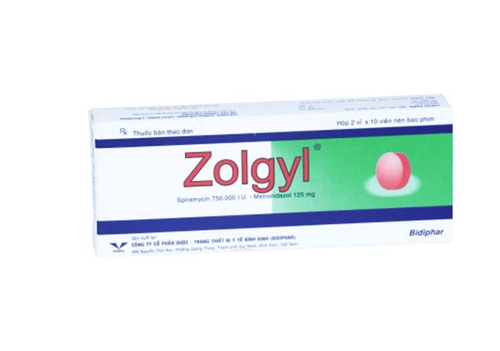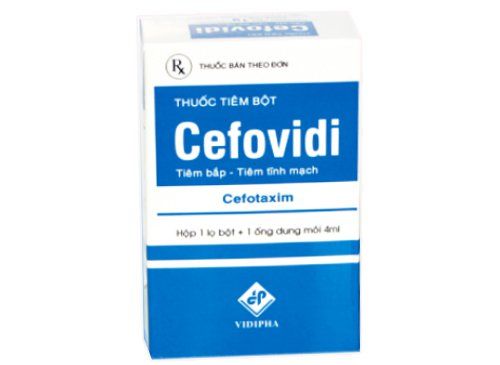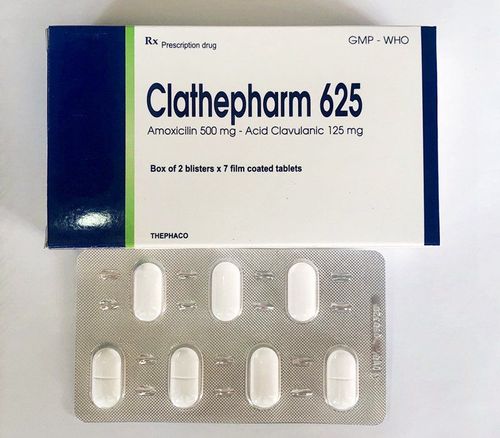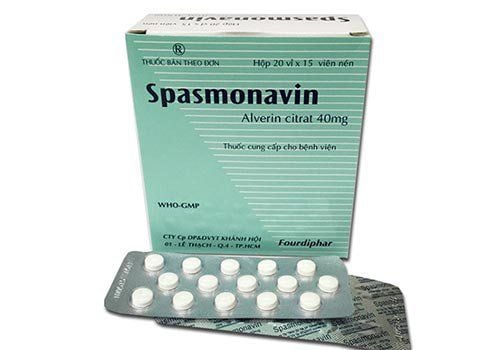This is an automatically translated article.
Ametrazol is a drug prescribed in the treatment of conditions related to parasites, fungal infections and viral infections. The drug Ametrazol is a perfect combination of the antibiotic Spiramycin with the antifungal active ingredient Metronidazol. This helps to increase the therapeutic effect of the drug, expand the spectrum of action as well as the indication for clinical use. The drug can be used by both adults and children. Do not use the drug in children under 5 years old.1. What is Ametrazol?
Ametrazol is a drug belonging to the group of drugs used to treat parasites, having both anti-bacterial, anti-viral and anti-fungal effects.The main ingredient of Ametrazol is Spiramycin 750000UI combined with Metronidazol 125mg.
These
1.1. Spiramycin
Spiramycin is an antibiotic belonging to the macrolide group of antibiotics.The drug is absorbed relatively quickly, but the amount is not completely absorbed. The absorption of Spiramycin in the body is not affected by food.
In the body, the drug is slowly metabolised in the liver and excreted in the bile, urine, and a large part in feces.
Main uses of Spiramycin:
The drug has a broad antibacterial spectrum, stronger effect than Erythromycin. Spiramycin is active against groups of bacteria such as Streptococcus, Staphylococcus, Helicobacter pylori, Mycoplasma Hominis, Vibrio, Enterococcus,... In addition, the drug also works in vitro on Toxoplasma gondii. Spiramycin is indicated for use in the following cases:
Treatment of inflammatory diseases caused by susceptible bacteria such as acute sinusitis, pharyngitis, superinfected bronchitis, exacerbations on the background of chronic bronchitis,. .. The drug also works well in patients with community-acquired pneumonia but without risk factors or signs of severe clinical symptoms. Indications for treatment of patients with suspected pneumonia of both severe and mild severity. Treatment of benign skin infections such as impetigo, subcutaneous infections, erysipelas, etc. Patients with genital infections due to gonorrhea. Prevention of the risk of recurrence of rheumatic fever in patients with a history of penicillin allergy, prevention of meningococcal meningitis and treatment of Toxoplasmosis in pregnant women.
1.2. Metronidazole
Metronidazole is one of the most commonly used antibacterial agents of the Nitro-5 imidazole class of drugs.Like Spiramycin, Metronidazole is absorbed into the body relatively quickly and is not affected by food. Clinical results show that absorption is similar for both oral and parenteral routes.
In the body, the drug is widely distributed and diffused on many different organ tissues such as liver, kidney, lung, brain fluid, saliva, semen,...
Metronidazol can cross the placental barrier and is also excreted in breast milk. The drug is metabolized mainly in the liver and excreted in the urine.
Effects of Metronidazol:
The drug has a good effect on amoebic dysentery bacteria both inside and outside the intestine, treating both patients with acute or chronic dysentery. The drug is also effective for people infected with Trichomonas Vaginalis, Clostridium, Helicobacter. Metronidazole has no effect on aerobic bacteria. Indications to use Metronidazol in the treatment of some diseases such as;
Diseases caused by amoeba. Genitourinary tract diseases caused by Trichomonas. Nonspecific vaginitis, operating room infections caused by anaerobic bacteria or diseases caused by Giardia Intestinalis. Prophylactic treatment of bacterial infections associated with anaerobic bacteria.
2. What are the uses of Ametrazol?
Ametrazol is indicated for use in the following cases:
Treatment of patients with acute or chronic oral infections, or frequent recurrences such as gingivitis, stomatitis, parotid gland inflammation, submandibular inflammation, inflammation periosteal tissue, periodontitis, tooth abscess,... Prophylactic treatment of oral infections after surgery. Contraindications to use the drug with:
Patients with a history of allergy or hypersensitivity to any of the ingredients of the drug. Do not use the drug on women who are breastfeeding.
3. Dosage and how to use Ametrazol
Ametrazol is produced in the form of film-coated tablets, boxed in 2 blisters, each blister contains 10 tablets.
The drug is made in the form of oral tablets, absolutely do not use the infusion phase or other drug routes.
Dosage:
For adults: Take 4 to 6 tablets/day divided into 2 to 3 times. For children from 10 to 15 years old: Take 1 tablet/time x 3 times/day. For children 5 to 10 years old: Take 1 tablet/time x 2 times/day.
4. Side effects and notes when using Ametrazol
Some side effects may occur when using Ametrazol:The drug causes digestive disorders leading to vomiting, nausea, diarrhea, stomach pain. Occurrence of allergic reactions such as urticaria on the skin with itching, ... Feeling like a metallic taste in the mouth, prone to stomatitis, gingivitis, leukopenia may also occur. Rare side effects if patients are treated for too long such as dizziness, loss of coordination, paresthesia, increased risk of sensory and motor polyneuritis. Red-brown urine. To limit the risk of unwanted side effects caused by Ametrazol, when using the drug, the following should be noted:
Use the drug according to the doctor's instructions, do not arbitrarily change the dose increase or decrease. quality without consulting a specialist or a person with expertise in medicine. Because the drug contains Acetyl Spiramycin, it should not be used together with oral contraceptives because it will lose the effectiveness of birth control pills. Use with caution in patients with suspected peptic ulcer, chronic colitis or ileitis. The drug is prepared in the form of film-coated tablets, when entering the body, the release will be slow, there is a risk of toxicity in the elderly or those with slow intestinal transit. Therefore, close monitoring is required if the drug is used in these groups of subjects. Do not take the medicine while lying down because there is a risk of choking or choking on the airways. Several animal studies have shown that the drug is not teratogenic in pregnant animals and is not toxic to the fetus. Although the component Spiramycin can cross the placental barrier, the concentration is relatively low, so it does not cause harm to pregnant women. For women who are breast-feeding, consult a doctor before taking this medicine because it can be excreted in breast milk. When used with Disulfiram in combination with Metronidazol ingredients in the drug, it can cause toxicity to the central nervous system leading to confusion and psychosis. On the other hand, Metronidazole also increases the toxicity of oral anticoagulants, increases the risk of bleeding due to decreased catabolism in the liver, increases the concentration of lithium in the blood causing toxicity if used with lithium. The drug enhances the effect of the muscle relaxant Vecuronium, increasing the toxicity of Fluorouracil by reducing renal clearance. Taking the drug with alcohol will cause Antabuse effect, clinical manifestations: Feeling hot, vomiting, heart palpitations. Store medications according to the manufacturer's instructions. Do not use the medicine after the expiry date. Keep medicine out of reach of children. Although the drug Ametrazol has many good effects in the treatment of diseases, the drug also has many side effects that affect health. Therefore, it is necessary to understand and grasp the basic information about drugs in order to use drugs safely. Please contact specialist doctors or reputable medical facilities if you are having unusual health problems that need to be examined and treated.













